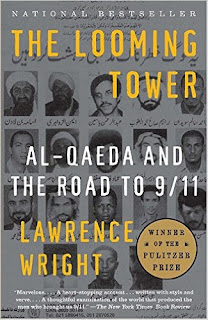November 13, 2015 around dusk here in Dothan, I had just gotten
in my car around 6 PM for a drive of a little over an hour to a sectional rally
when the top of the hour newscast began describing the terrorist attacks in
Paris. These attacks fell into a
different category because they had been coordinated to hit several different
places in Paris at the same time. Only
10 months earlier in January, terrorists had attacked Charlie Hebdo and two
days later a Jewish grocery store had been attacked as well all leaving a small
number of casualties but not a large amount of injuries. On the way home from the sectional rally, the
talk radio outlets, which I hadn’t listened to for several years lured me back
in, because they were blazing with opinions and reports. I cannot remember where or how I ran across a
New York Times journalist but Rukmini Callimachi entered my world that evening
when I got home and started reading on the internet the accounts of the Paris
attacks. She had a Twitter feed that she
was using very well and tagging a variety of articles that she had written in
the past on terrorism. I started
following her on Twitter although admittedly she is very liberal in much of her
ideations, I began to learn much more about terrorism and its origins. I then contacted her via email and surprisingly
she replied to me several times with book suggestions and various journal
articles, some that were hers and some that were written by others. She suggested a book that I am putting in the
eighth slot of best books that I read in 2016.
The book she wrote that everyone should start with is by Lawrence
Wright.
Lawrence Wright is a Pulitzer Prize winner for his writing
and serves primarily as an investigative journalist with a focus on terror and
its activities. He taught in Egypt for a
couple of years in the early stages of his career and that experience would
assist him in getting a good look at the nature of the people whom he would later
write about. This book, The Looming Tower, is an excellent
book! Frankly, I had very little idea as
to how a terror movement could become so fearsome and devoted to a cause with
very little high tech weaponry that the United States and other military powers
around the world had at their disposal.
He starts in chapter one describing the activities of Sayyid Qutb (pronounced
kuh-tub). His work, his writings, and his execution set
forth the movement that would later affect a whole generation of radicalized
men who would do their very best to bring the religion of Islam to a place to
try to control the world. Remarkably,
Qutb’s execution took place in 1966 but his writings outlived him and it
affected an entire generation of radicalized followers of Islam.
Wright moves through the assassination of Anwar Sadat which
took place when I was a ninth grader. He
then starts moving toward the impact that Osama bin Laden would make. The Saudi family of bin Laden’s was
incredibly wealthy due to hard work and political alliances that opened doors
for their construction company. Wright
then follows bin Laden from his wealth to his utter poverty and living in the
caves of Tora Bora. The story connects
the dots with bin Laden with Omar Mullah and Ayman al-Zawahiri who succeeded
bin Laden after his death. As a pastor,
I was awed by their devotion to their purpose and convicted as to how soft the
American church has become in its efforts to promote the true message of the
Apostolic faith. These radicals have
used every bit of their financial holdings, their physical health, and their
mental capacity through writing and teaching the tenets of Mohammed. Whether we agree or disagree with them (which
I wholeheartedly disagree), I can only think that my own commitment to the Lord
Jesus Christ pales in comparison to the devotion to the doctrine of devils that
they are using to motivate them.
Toward the end of the book, Wright, weaves into his tale the
conflict between the FBI and CIA and National Security Council. He notes the distraction that former
President Bill Clinton had when it came to the vigilance that was needed toward
terror and it ended up nabbing us as a nation on 9/11. Furthermore, some of Wright’s descriptions of
the characters that are involved such as John O’Neill, Richard Clark, Louis
Freeh, and others is very compelling. He
does not just tell the story but he gets into their minds after observing their
actions. In my thoughts, this was another
one of the most powerful elements of this book but he doesn’t just do this with
the American characters, he has the unique ability to make psychological
assessments about the terrorists themselves.
Over my years of reading, this has come across to me as one of the most
powerful elements of any writer who goes the extra mile than to just tell a
story.
On a concluding note, the books in this genre (my next one
is also on this subject) have really proved a critical point about religious
life at large. When a religion is based completely
on law, rule, or a rigid moral code it will always fail! For this reason, unless there has been a
radical spiritual change, attempting to keep the law will force one into
legalism which in turn causes much hypocrisy to be lived out because of the
tension that is created. I think you
would connect with this book if you have any interest as to what is taking
place with a portion of the conflict that is taking place in the Middle East.
Thanks for reading. . .






No comments:
Post a Comment